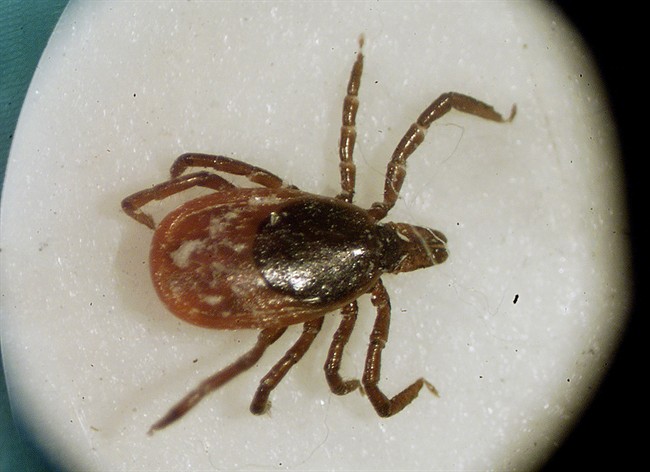Toronto Public Health has confirmed blacklegged ticks have been found in parts of the city and are being tested for Lyme disease.

The agency also has a Lyme Disease Tick Surveillance Program in place and has started dragging in wooded and bushy areas in the city for ticks, said Veenboer. Dragging occurs when researchers take a piece of white cloth and drag it through areas potentially containing ticks to gather for testing.
READ MORE: Testing for deadly virus in ticks expanded
The National Microbiology Laboratory in Winnipeg tests the ticks for Lyme disease, and getting results can take several weeks.
Veenboer added that the risk for Lyme disease across Toronto is low.
Last November, public health officials in Toronto, York and Durham confirmed that blacklegged ticks found in Rouge Valley tested positive for the bacteria that causes Lyme disease.
Lyme disease is an infection caused by Borrelia burgdorferi, a bacteria that is transmitted by a species of deer or blacklegged ticks. Health officials say contracting the disease is most likely in the spring and summer months as more people head outside.
READ MORE: Tick in Sudbury tests positive for bacteria that can cause Lyme disease
- Ontario doctors offer solutions to help address shortage of family physicians
- Capital gains changes are ‘really fair,’ Freeland says, as doctors cry foul
- ‘Dangerous message’: Experts slam anti-sunscreen claims circulating online
- ‘Trying not to die’: Tourism operators loaded with debt despite rising demand
According to Canada’s Public Health Agency, symptoms differ from person to person and occur within three days after a tick bite or as long as a month after being infected. Symptoms include: fever, headache, muscle and joint pains, fatigue and a “bull’s-eye”-shaped rash at the site of the tick bite.
Toronto Public Health is reminding people to take precautions when heading into wooded or brushy areas around the city.
Some tips to avoid exposure to tick bites include:
- Wearing a long-sleeved shirt, long pants, socks and closed footwear
- Tucking your pants into your socks and wearing light-coloured clothing, making ticks easier to spot
- Using an insect repellent that contains DEET on clothing and exposed skin
- Examining yourself thoroughly for ticks after going outside
- Using a tick and flea collar on your pets and checking them for ticks routinely
If a tick is discovered on you or your pet it should be removed immediately using a clean pair of tweezers. Removing a tick within 24 to 36 hours of being bitten usually prevents infection, according to Health Canada.




Comments